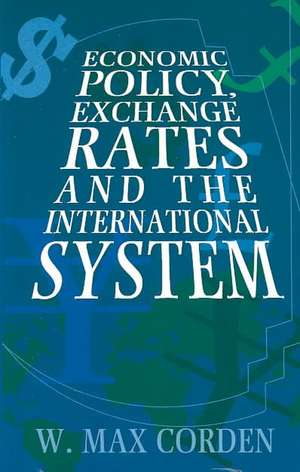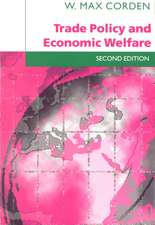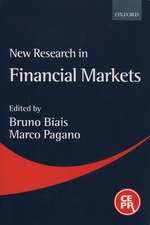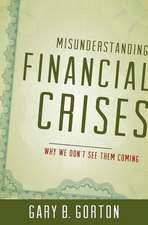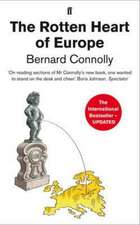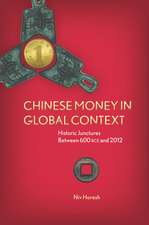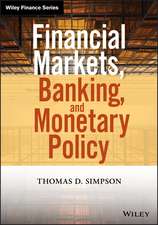Economic Policy, Exchange Rates, and the International System
Autor W. Max Cordenen Limba Engleză Paperback – 30 noi 1994
An ambitious successor to W. Max Corden's highly acclaimed Inflation,
Exchange Rates, and the World Economy, this book addresses topics in
international macroeconomics that have come to the forefront of economic
policy debates in recent years. Covering exchange rate policy, the
European Monetary System, protection and competition, and the
international "non-system" since the collapse of Bretton Woods, Corden
provides a probing analysis of significant economic trends associated
with the increasing integration of the world capital market.
Beginning with essays on exchange rate policy, the current account, and
external effects of fiscal policy, Corden lays out the foundations of
balance-of-payments theory in relation to wage rates, income
distribution, and inflation. Chapters on the European Monetary System
focus on monetary integration and look skeptically at European proposals
to move toward monetary union. Other topical essays discuss the
"competitiveness" problem and the relation between protection and
macroeconomic policy.
Corden summarizes and clarifies a vast range of work on the coordination
of macroeconomic policies and critically reviews various proposals for
reforming the international monetary system.
Exchange Rates, and the World Economy, this book addresses topics in
international macroeconomics that have come to the forefront of economic
policy debates in recent years. Covering exchange rate policy, the
European Monetary System, protection and competition, and the
international "non-system" since the collapse of Bretton Woods, Corden
provides a probing analysis of significant economic trends associated
with the increasing integration of the world capital market.
Beginning with essays on exchange rate policy, the current account, and
external effects of fiscal policy, Corden lays out the foundations of
balance-of-payments theory in relation to wage rates, income
distribution, and inflation. Chapters on the European Monetary System
focus on monetary integration and look skeptically at European proposals
to move toward monetary union. Other topical essays discuss the
"competitiveness" problem and the relation between protection and
macroeconomic policy.
Corden summarizes and clarifies a vast range of work on the coordination
of macroeconomic policies and critically reviews various proposals for
reforming the international monetary system.
Preț: 200.56 lei
Preț vechi: 230.78 lei
-13% Nou
Puncte Express: 301
Preț estimativ în valută:
38.38€ • 39.65$ • 31.94£
38.38€ • 39.65$ • 31.94£
Carte indisponibilă temporar
Doresc să fiu notificat când acest titlu va fi disponibil:
Se trimite...
Preluare comenzi: 021 569.72.76
Specificații
ISBN-13: 9780226115917
ISBN-10: 0226115917
Pagini: 331
Ilustrații: 15 line drawings
Dimensiuni: 140 x 216 x 20 mm
Greutate: 0.45 kg
Ediția:1
Editura: University of Chicago Press
Colecția University of Chicago Press
ISBN-10: 0226115917
Pagini: 331
Ilustrații: 15 line drawings
Dimensiuni: 140 x 216 x 20 mm
Greutate: 0.45 kg
Ediția:1
Editura: University of Chicago Press
Colecția University of Chicago Press
Cuprins
List of Figures
List of Tables
Abbreviations
1: Introduction
2: A Model of Balance-of-Payments Policy
3: Income Distribution, Wage Rigidity, and Balance-of-Payments Policy
4: Fiscal Policy, Monetary Policy, and Capital Mobility
5: Inflation and Exchange Rate Policy
6: Does the Current Account Matter?
7: The European Monetary System
8: Monetary Integration
9: Maastricht and the Transition to Monetary Union
10: The International Macro-System
11: The International Transmission of Disturbances
12: What Determines Exchange Rates in a Floating Rate Regime?
13: Macroeconomic Policy Coordination
14: Macroeconomic Policy and Protection
15: What Is the Competitiveness Problem?
16: The Exchange Rate Regime: Choices and Plans
Bibliography
Index of Names
Index of Subjects
List of Tables
Abbreviations
1: Introduction
2: A Model of Balance-of-Payments Policy
3: Income Distribution, Wage Rigidity, and Balance-of-Payments Policy
4: Fiscal Policy, Monetary Policy, and Capital Mobility
5: Inflation and Exchange Rate Policy
6: Does the Current Account Matter?
7: The European Monetary System
8: Monetary Integration
9: Maastricht and the Transition to Monetary Union
10: The International Macro-System
11: The International Transmission of Disturbances
12: What Determines Exchange Rates in a Floating Rate Regime?
13: Macroeconomic Policy Coordination
14: Macroeconomic Policy and Protection
15: What Is the Competitiveness Problem?
16: The Exchange Rate Regime: Choices and Plans
Bibliography
Index of Names
Index of Subjects
Descriere
Descriere de la o altă ediție sau format:
In an outstanding account of exchange rates inthe international monetary system, W. Max Corden considers the essential issues in international macroeconomics.The author takes as his model the macroeconomic situation of a country with an open economy, and explains the effects of domestic fiscal and monetary macroeconomic policy on exchange rates. He clearly analyses the choices faced by governments attempting to manage both the domestic inflation rate and the external exchange rate and current account balance. Professor Corden then discusses the European Exchange Rate mechanism, and provides a sceptical analysis of the possibilities for monetary union in Europe, and for international policy coordination in general. He gives equal weight to discussion of the present US-centred international monetary system outside the ERM, and combines theoretical models with an account of the actual determination of floating exchange rates. Although the book itself is orientated towards monetary rather than trade issues, the author discusses two topical issues: the role of protectionist policies, and the idea of competitiveness. Finally, he looks at the future of the international monetary system and the series of current reform proposals.Students will find this book useful because the author covers essential issues lucidly and authoritatively. The exposition is entirely non-mathematical. Postgraduate students and academics will be interested since Corden is a distinguished writer on international trade and policy, and his arguments are powerfully presented.New to this edition:This is a revised and expanded edition of a previous book by Corden, Inflation, Exchange Rates and the World Economy, the third edition of which was published in 1985. In this new book, Professor Corden has fully rewritten the text, but retains the discursive, informal, reader-friendly style of the earlier editions. In this new edition, Professor Corden has included two new chapters which extend the treatment of macroeconomic policy, separating it into its fiscal and monetary branches. He also includes a new chapter on the role of the current account balance in determining macroeconomic policy. The author has brought his account of the present international monetary context up to date - characterised as the non-system - and has included a new analysis of European monetary issues, incorporating a review of the progress of the EMS towards full monetary union. The book also contains a provocative discussion of two highly topical issues: trade protection, and competitiveness, including both new theoretical analysis and such events as the recent GATT agreement.
In an outstanding account of exchange rates inthe international monetary system, W. Max Corden considers the essential issues in international macroeconomics.The author takes as his model the macroeconomic situation of a country with an open economy, and explains the effects of domestic fiscal and monetary macroeconomic policy on exchange rates. He clearly analyses the choices faced by governments attempting to manage both the domestic inflation rate and the external exchange rate and current account balance. Professor Corden then discusses the European Exchange Rate mechanism, and provides a sceptical analysis of the possibilities for monetary union in Europe, and for international policy coordination in general. He gives equal weight to discussion of the present US-centred international monetary system outside the ERM, and combines theoretical models with an account of the actual determination of floating exchange rates. Although the book itself is orientated towards monetary rather than trade issues, the author discusses two topical issues: the role of protectionist policies, and the idea of competitiveness. Finally, he looks at the future of the international monetary system and the series of current reform proposals.Students will find this book useful because the author covers essential issues lucidly and authoritatively. The exposition is entirely non-mathematical. Postgraduate students and academics will be interested since Corden is a distinguished writer on international trade and policy, and his arguments are powerfully presented.New to this edition:This is a revised and expanded edition of a previous book by Corden, Inflation, Exchange Rates and the World Economy, the third edition of which was published in 1985. In this new book, Professor Corden has fully rewritten the text, but retains the discursive, informal, reader-friendly style of the earlier editions. In this new edition, Professor Corden has included two new chapters which extend the treatment of macroeconomic policy, separating it into its fiscal and monetary branches. He also includes a new chapter on the role of the current account balance in determining macroeconomic policy. The author has brought his account of the present international monetary context up to date - characterised as the non-system - and has included a new analysis of European monetary issues, incorporating a review of the progress of the EMS towards full monetary union. The book also contains a provocative discussion of two highly topical issues: trade protection, and competitiveness, including both new theoretical analysis and such events as the recent GATT agreement.
Recenzii
`Good exposition, very technical, right level. Very good on comparative issues.'N. Sarantis, Kingston University
`It is very good at the introductory level to understand real issues.'Dr D. Barn, University of Kent
`The book is reasonably priced and well-designed. As always, Corden is very lucid.'Heikki Taimio, University of Joensuu, Finland
In Max Corden we have one of today's leading international economists. And in his latest book we surely have an essential addition to the library of any serious student of international monetary economics.
An essential addition to the library of any serious student of international monetary economics ... a very useful text for students of both economics and international law and one which reveals the extent to which these two disciplines depend on each other ... The book provides a comprehensive coverage of the subject of trade regulation.
`It is very good at the introductory level to understand real issues.'Dr D. Barn, University of Kent
`The book is reasonably priced and well-designed. As always, Corden is very lucid.'Heikki Taimio, University of Joensuu, Finland
In Max Corden we have one of today's leading international economists. And in his latest book we surely have an essential addition to the library of any serious student of international monetary economics.
An essential addition to the library of any serious student of international monetary economics ... a very useful text for students of both economics and international law and one which reveals the extent to which these two disciplines depend on each other ... The book provides a comprehensive coverage of the subject of trade regulation.
